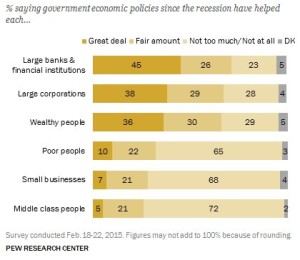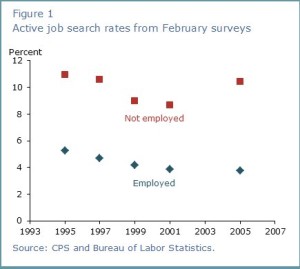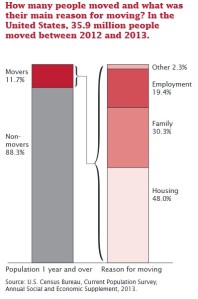-
Revisiting Apprenticeships
Continue ReadingBy the American Council on Education
While the word apprenticeship may evoke images of craft guilds in the Middle Ages, the concept is gaining new currency today in the United States. Here’s what you need to know.
 An online search for the term “apprenticeship” quickly yields illustrations of medieval bakers and roof thatchers. With those images in mind, it’s a bit disconcerting when Sarah Ayres Steinberg, a policy analyst on the economic policy team at the Center for American Progress, says that right now in the United States, “apprenticeship is a very
An online search for the term “apprenticeship” quickly yields illustrations of medieval bakers and roof thatchers. With those images in mind, it’s a bit disconcerting when Sarah Ayres Steinberg, a policy analyst on the economic policy team at the Center for American Progress, says that right now in the United States, “apprenticeship is a very
hot topic.” (more…) -
Most Believe Employment Recovery is Only Partial
Continue Readingfrom the Pew Research Center
The latest national survey by the Pew Research Center, conducted Feb. 18-22 among 1,504 adults, finds that opinions about whether various aspects of the economy – jobs, household incomes and the stock market – have recovered from the recession are much more positive than they were two years ago.
 More See Partial Recovery in Job Situation, Household Incomes—Fully 67% say the job situation has recovered at least somewhat from the recession, which is up 20 points from September 2013. However, most (60%) see only a partial recovery in jobs: Just 7% think that the job situation has fully recovered from the recession. And nearly a third (32%) thinks the job situation “has hardly recovered at all.” (more…)
More See Partial Recovery in Job Situation, Household Incomes—Fully 67% say the job situation has recovered at least somewhat from the recession, which is up 20 points from September 2013. However, most (60%) see only a partial recovery in jobs: Just 7% think that the job situation has fully recovered from the recession. And nearly a third (32%) thinks the job situation “has hardly recovered at all.” (more…) -
Majority of Hires Never Report Looking for a Job
Continue Readingby Carlos Carrillo-Tudela, Bart Hobijn, Patryk Perkowski, and Ludo Visschers
FRBSF Economic Letter Every month, millions of workers search for new jobs although they already have one. About one-tenth of these searchers switch employers in the following month. However, most of the job switchers in the United States never reported having looked for a job. This implies that, rather than those workers finding jobs, the jobs actually found them.
Every month, millions of workers search for new jobs although they already have one. About one-tenth of these searchers switch employers in the following month. However, most of the job switchers in the United States never reported having looked for a job. This implies that, rather than those workers finding jobs, the jobs actually found them.In conventional models of the labor market, unemployed people search for jobs and respond to job openings posted by employers (as in Mortensen and Pissarides 1994). However, job search is not limited to just those currently without jobs. Each month, millions of employed people also search for new jobs hoping to change employers. While a lot is known about the job-search behaviors of the unemployed, the same is not true for the employed. (more…)
-
12 Myths About Writing Your Resume
Continue Readingby Jacquelyn Smith, Forbes Magazine
 As a dedicated job seeker, you’ve probably spent hours writing, tailoring and blasting your perfectly polished resume. You’re confident you have done everything right: The flawless document is confined to one page; includes a clear objective; and lists a plethora of soft skills. But as it turns out, contrary to popular belief, those features don’t necessarily make for an ideal resume.
As a dedicated job seeker, you’ve probably spent hours writing, tailoring and blasting your perfectly polished resume. You’re confident you have done everything right: The flawless document is confined to one page; includes a clear objective; and lists a plethora of soft skills. But as it turns out, contrary to popular belief, those features don’t necessarily make for an ideal resume.Here are some resume writing myths:
Myth: You must reference references. “While references will likely matter further into the interview process, noting on your resume that ‘references are available upon request’ will not make your resume stand out,” says Jacob Bollinger, lead data scientist at Bright.com, an employment site with more than 2.5 million job listings. (more…)
-
Reason for Moving
Continue Reading Between 2012 and 2013, 35.9 million people 1 year and over living in the United States moved to a different residence. The mover rate for this period was 11.7 percent. Why did these people move? As displayedin Figure 1, housing-related reasons were the most popular response with 17.2 million (48.0 percent).1 Family-related reasons were the second most selected choice with 30.3 percent, followed by job-related (19.4 percent) and other (2.3 percent). These data come from the 2013 Annual Social and Economic Supplement (ASEC) of the Current Population Survey (CPS). The 2013 ASEC questionnaire had a list of 18 common reasons for moving, with an additional option to write-in reasons that did not fit into any of the predetermined choices.
Between 2012 and 2013, 35.9 million people 1 year and over living in the United States moved to a different residence. The mover rate for this period was 11.7 percent. Why did these people move? As displayedin Figure 1, housing-related reasons were the most popular response with 17.2 million (48.0 percent).1 Family-related reasons were the second most selected choice with 30.3 percent, followed by job-related (19.4 percent) and other (2.3 percent). These data come from the 2013 Annual Social and Economic Supplement (ASEC) of the Current Population Survey (CPS). The 2013 ASEC questionnaire had a list of 18 common reasons for moving, with an additional option to write-in reasons that did not fit into any of the predetermined choices.
